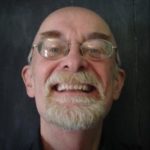The Large Hadron Collider, or, I Have Never Met Father John Misty, Irrespective of What This Essay Might Imply
 I’ve had a rough couple of years. My dad got sick, then my husband got sick, and I became a lot more curious about the nature of being than I was before. Lately, I’ve been thinking a lot about the Large Hadron Collider. In case you are not also wedged firmly between a rock and a firm location, devouring particle physics literature like a Kardashian hoarding Us Weekly, the Large Hadron Collider is the world’s largest and most powerful particle accelerator. It’s the largest single machine in existence, built in collaboration with more than 10,000 scientists and engineers from around the world.
I’ve had a rough couple of years. My dad got sick, then my husband got sick, and I became a lot more curious about the nature of being than I was before. Lately, I’ve been thinking a lot about the Large Hadron Collider. In case you are not also wedged firmly between a rock and a firm location, devouring particle physics literature like a Kardashian hoarding Us Weekly, the Large Hadron Collider is the world’s largest and most powerful particle accelerator. It’s the largest single machine in existence, built in collaboration with more than 10,000 scientists and engineers from around the world.
Maybe I have felt, over the past two years or so, a little sympathetic to the lead electron at the nose of that high-speed electron beam, roaring around an accelerator ring at nearly light speed, every lap incrementally nudging closer to a head-on collision with an opposing electron beam, traveling at equal speed. But, less dramatically, I’ve been thinking more about what scientists have found.
The intent of the Large Hadron Collider is to investigate the structure of the atomic nucleus. (I copied that from the LHC website). But it’s been doing more than that. Like any scientific investigation of the unknown, it has the potential to change everything by altering our perception of the nature of stuff. If, for example, the LHC reveals that energy becomes matter in describable and predictable circumstances, or becomes matter by describable and predictable mechanisms, it would radically change how we see the universe. It’s literally an infinitesimally tiny change, but it would be a boundless change, philosophically.
We already believe/theorize that matter and energy are neither created nor destroyed, which basically means that everything in the universe was always here, in some iteration of either matter or energy. Everything that you are always was, and always will be, in one form or (maybe and/or) another. You are, and always have been, infinite. You probably knew this already, deep down. It’s the kind of thing you can feel, even if it takes you half your life to put it into words, or the words you finally find are from the Large Hadron Collider website.
Everything I am has been recycled (making Solomon’s “nothing new” comment a little more empirical than prophetic). Everything you are was something else before it was you, and will eventually be something else after. Nothing new comes from anywhere. It was all here, just shuffled around. We’re all eternal. There is no past, no future. It is and has always been now, according to our composition of stuff.
There is a line in Michael Ende’s book, Momo, when Guisseppe asks Momo how old she is and she replies, “As far as I know, I’ve always been around.” Us, too.
Since the dawn of science, pretty much, humans have been searching for one unifying theory of everything — one set of rules to describe how the universe works. Pure science often distances itself from “WHY?” The more ruminative or philosophical science community tarries on “WHY?” but returns first to “HOW?” as the first answerable question, since “WHY?” is a dependent variable. So far, most every new determination in science has been used to take the magic out of “WHY?” to make it explicable, intelligible, and rational. Crashing these electrons around and finding, in the resulting measurable detritus, the field in which energy becomes matter, is the scientific equivalent of finding the body of Christ, withered and carbon-based, behind a very solid rock. It means to many there is no unifying force of creation. No sentient or, more importantly, benevolent force orchestrating the matter and energy of the universe. No God, loving us individually.
This is confusing to me, in the same way evolution somehow disproving any creation stories confuses me. In fact, I can’t believe one without the other. I feel closer to understanding the organizing force of the universe when destruction and transformation are part of the magic, too.
As Lex Luthor said in the latest Superman installation, “If God is all good, He can’t be all powerful.” And that’s bumper-sticker simple, right? But it’s also gorgeous. Choose your nomenclature — God, Allah, Gaia(aiaiaiaia), the Universe — in the way that resonates with you, because that’s important. But the rest of the sentence is fine. The cancer is part of the magic. The dying is part of the magic. It’s not the end, or the tailings pile, or the dregs. It’s as much a part of the system as the fucking, the cheeseburgers, the birthing, the poetry, the fall of the Berlin wall; it’s as real and intrinsic to being as your beating heart. It’s not the shadow to the light — not the opposite of life or the other side of the coin. Scientifically, there is no opposite of entropy.
Entropy is the measure of disorder in a system. It’s a scientific measure, not a philosophic discussion. But if it’s a tumor growing in some dark, secret part of your perfect, faithful, kind-hearted, altruistic body, entropy becomes philosophical. It leads a person to consider the infinite life of his or her stuff — the matter and energy that make her or him.
If entropy is an essential, inevitable part of being, and being is meaningful, then entropy must be meaningful, too. Moreover, because I’m intrinsically related to the Universe, I’m comparably connected to you, to your husband’s cancer, to Rwanda, and to Philando Castile. The space between us is expansive at the same time our connection is connate — definitive, part of the fundamental laws of the universe. And, for some reason I still don’t understand, I have the ability to willfully operate my own little world-builder. I have the ability to decide.
Our thoughts are made of the same stuff of the universe — of space and hotdogs and nebulae. We are organizing and sending our own patterns of stuff around the universe all the time. We are touching everything, in our regard of it, all the time. And everything, every new pattern of thought that corresponds with our own experience, our own soul or mind, was something else before, and will be something after. This makes me wonder how much of what happens to us is primarily ours alone, not yours, but mine, particularly? How much do we share? What of me is you, too, right now? What is the subatomic delineation of “we?”
When I think about the electrons in my body, responsible for the communication of thoughts to action, and how enormous they are, compared to the much smaller particles responsible for the creation of matter, I feel suddenly aware of how powerful that ability to decide is. I can make meaning. I can love, forgive, create. If I want to change the universe, all I have to do is change my mind. The force of my intention is a literal force. This is tremendously comforting to me.
We have such power over each other, and such importance to each other. It breaks my heart with precisely the same crushing strength that it uses to open me wide, like a nascent star.
Because it was always and still is now, according to our matter — but the conformation of now we’re creating and experiencing doesn’t need to include this hate machine or that constellation of shared sorrow, which are using the building materials that might otherwise be devoted to moons or oceans or miracles.
One electron, at the head of a roaring stream, circling faster and faster, edging closer and closer to collision. One tiny particle, breaking apart the fabric of the universe, revealing a billion smaller universes within it. No control, but so much power. The world happens to us, but we happen to the universe. And in the end, we share everything.
Recommended Links:
Leave a Comment
Only registered members can post a comment , Login / Register Here














1 Comment
vicarious
about 8 years ago